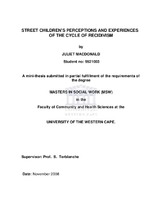| dc.description.abstract | Includes bibliographic references (leaves 70-80)."The goal of this research was to explore and describe the experiences and perceptions of the street children about the cyclical pattern of recidivism. To gain in- depth information regarding this issue, a qualitative research approach was followed. Data were collected by means of story-telling, guided by two foundational question themes. Firstly, experiences of family life and schooling and secondly, experiences of survival on the street and repeated criminal involvement. Data were analyzed according to the guideline discussed in Creswell (l998). Data were verified by means of measures suggested by Creswell (l998). Findings indicated that participants in this study suffered severe emotional and physical and material deprivation in their family contexts before moving to the street. Survival on the street depended on befriending other street children; begging on the street; abusing substances and getting involved in crime. Motivational factors for repeatedly being involved in crime were peer pressure,
substance abuse, no fear of prosecution and opportunity/mischief. It was clear that participants were caught up in a “sub-culture” of life on the street. | en_US |

